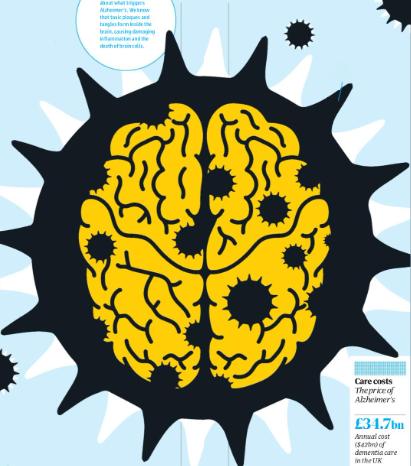
As Davangere Devanand, a neurologist at Columbia University Medical Center, combed through the reams of scientific data on Alzheimer's, he stumbled across a surprising idea - could an infection be involved in driving the disease?
"I was looking for an Alzheimer's treatment approach that had a reasonable shot of working," he says. "I found this old theory, going back 35 years, which linked herpes viruses to the disease, and there were all these indirect lines of evidence."
The further Devanand looked, the more he found. Since the mid-80s, a handful of scientists around the world had doggedly pursued the idea that either a virus or a bacterium could play a role in Alzheimer's, despite almost complete antipathy from those studying more accepted theories about the disease. Colleagues snubbed them, leading scientific journals and conferences rejected their work and funding had been threadbare, but slowly and surely, they built an increasingly compelling case.
In particular, evidence pointed towards herpes simplex virus 1 (HSV-1) - a pathogen found in 70% of the UK population, and the cause of oral herpes as a prominent suspect. Studies in the UK, France and Scandinavia suggested that people who had been infected with herpes were more likely to get Alzheimer's. When Prof Ruth Itzhaki from Oxford University's Institute of Population Ageing - who has done more than any other scientist to advance the HSV-1 theory of Alzheimer's - examined postmortem brain samples from patients, she found greater amounts of the virus's DNA than in people who had not died of the disease.
"Then there was this 2018 study from Taiwan, which was quite dramatic," says Devanand. "When people with herpes were treated with a standard antiviral drug, it decreased their risk of dementia nine-fold."
This story is from the February 24, 2023 edition of The Guardian Weekly.
Start your 7-day Magzter GOLD free trial to access thousands of curated premium stories, and 9,000+ magazines and newspapers.
Already a subscriber ? Sign In
This story is from the February 24, 2023 edition of The Guardian Weekly.
Start your 7-day Magzter GOLD free trial to access thousands of curated premium stories, and 9,000+ magazines and newspapers.
Already a subscriber? Sign In

No 298 Bean, cabbage and coconut-milk soup
Deep, sweet heat. A soup that soothes and invigorates simultaneously.

Cottage cheese goes viral: in reluctant praise of a food trend
I was asked recently which food trends I think will take over in 2025.

I'm worried that my teenage son is in a toxic relationship
A year ago, our almost 18-year-old son began seeing a girl, who is a year older than him and is his first \"real\" girlfriend.

BOOKS OF THE MONTH
A roundup of the best recent science fiction, fantasy and horror

Dying words
The Nobel prize winner explores the moment of death and beyond in a probing tale of a fisher living in near solitude

Origin story
We homo sapiens evolved and succeeded when other hominins didn't-but now our expansionist drive is threatening the planet

Glad rags to riches
Sarcastic, self-aware and surprisingly sad, the first volume of Cher's extraordinary memoir mixes hard times with the high life

Sail of the century
Anenigmatic nautical radio bulletin first broadcast 100 years ago, the Shipping Forecast has beguiled and inspired poets, pop stars and listeners worldwide

How does it feel?
A Complete Unknown retells Bob Dylan's explosive rise, but it als resonates with today's toxic fame and politics. The creative team expl their process-and wha the singer made of it all
Jane Austen's enduring legacy lies in her relevance as a foil for modern mores
For some, it will be enough merely to re-read Persuasion, and thence to cry yet again at Captain Wentworth's declaration of utmost love for Anne Elliot.